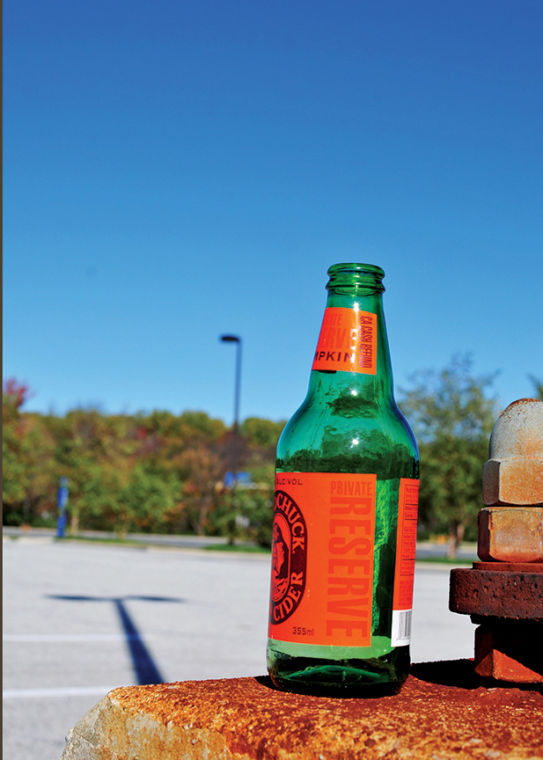
Trash left on the base of a streetlight in Lot 9 outside Comcast Center, a popular tailgating area.
For some students, knocking back a few beers and grilling burgers with their friends is a pregame ritual during football season, whether they do it in a parking lot, their apartment or behind a fraternity house.
But a new proposal from the Interfraternity Council and Student Government Association representatives could change that. In an effort to ease neighborhood tensions, increase safety and boost student attendance at games as the university prepares to move to the Big Ten, the council is proposing the university allow students to organize tailgating on the campus during next fall’s football season.
Authored by students from both groups, the proposal aims to get students out of the neighborhoods and onto the campus, where wild behavior and loud music could be more easily controlled.
“In our eyes, we see this as an incredibly valuable proposal for the athletic department to support,” said Michael Sikorski, IFC external relations vice president.
Athletic department officials declined to offer any official comment on the proposal, but spokesman Zack Bolno wrote in a statement that the department is always supportive of safe and fun student spirit.
The proposal is still in its early stages, but the groups still expect to present a final version to the athletic department before football season starts — an admittedly ambitious plan, Sikorski said — by working through the summer.
They’ve experienced a number of setbacks in the proposal’s development. Between meetings with University Police Chief David Mitchell and the Terrapin Club, the university athletics booster club, the group hoped to have a trial run of an on-campus tailgate this spring before a men’s lacrosse game against Johns Hopkins. The plans fell through, though, Sikorski said.
“On our end, [planning for the Johns Hopkins game] was overambitious,” Sikorski said. “[The athletic department] didn’t have enough time on their end to bring it up in any legitimate discussion.”
In the meantime, the group plans to draft a more extensive version of the proposed legislation, working off a similar model authored by the IFC at Clemson University. It’s not meant to be based on a culture of drinking and partying — rather, group members envision legislation that would promote sportsmanship, school spirit and game attendance, Sikorski said.
Many times, students in Greek life tailgating in the Old Town neighborhood won’t even make it to the games, said Michael Gold, IFC internal affairs vice president.
While they aren’t solid yet, the provisions of the proposal aim to address this issue. Students who tailgate on the campus would probably be more likely to go games, and SGA city council liaison Josh Ratner said the proposal will mandate tailgates end 15 minutes before kickoff.
Despite good intentions, the plan might be too optimistic, Mitchell said. Even though many students regularly drink before games, he said, any on-campus tailgates would have to face heavy restrictions, especially when it comes to alcohol.
“The fact of the matter is there are probably underage members of the university — students — who have consumed at one of the tailgates,” Mitchell said.
While he does trust that a majority of students will follow the law and police will have enough discretion to separate minor and major tailgating issues, he worries allowing students to tailgate on the campus as they please would encourage dangerous binge drinking. One particular restriction he had in mind was banning drinking games at tailgating events.
“Those are the type of games that, regardless of age, nothing good can come from it,” Mitchell said.
Mitchell said he plans to meet with a representative from every Greek organization involved in on-campus tailgating before the events in order to explain the regulations and safety precautions.
“It just seems to me that this is a concept worthy of more discussion and a pilot,” Mitchell said, adding he hopes there will be a practice tailgate sometime this summer.
Though the Greek community seems excited by the possibility of tailgating on the campus, Gold said it will be important to get each organization onboard with all of the other interest groups involved. At the end of the day, Gold said he believes having more restrictions on tailgates but holding them on the campus will be a worthwhile “trade-off.”
Freshman community health major Jacqueline Betro isn’t so optimistic about the trade-off, though.
“Some people might be deterred because of the special restrictions,” Betro said.
But the idea does have its merits, freshman business major Meredith Gentzel said. She has friends who tailgated off the campus and often didn’t make it to the games, while she attended a tailgate on the campus and was pleasantly surprised by how much fun it was.
“It was really controlled and fun,” she said. “It’s almost sad, because you want there to be some school spirit.”



